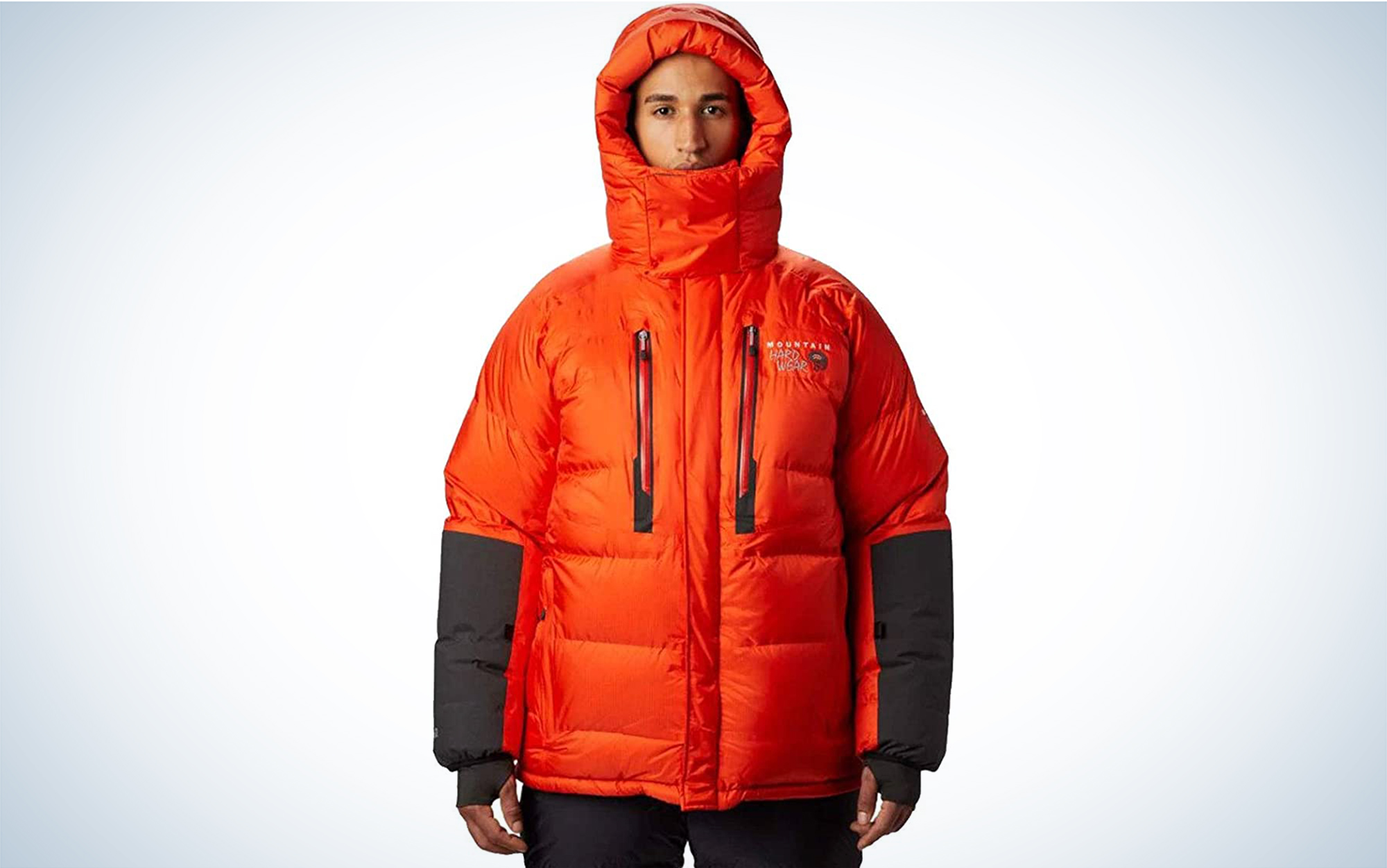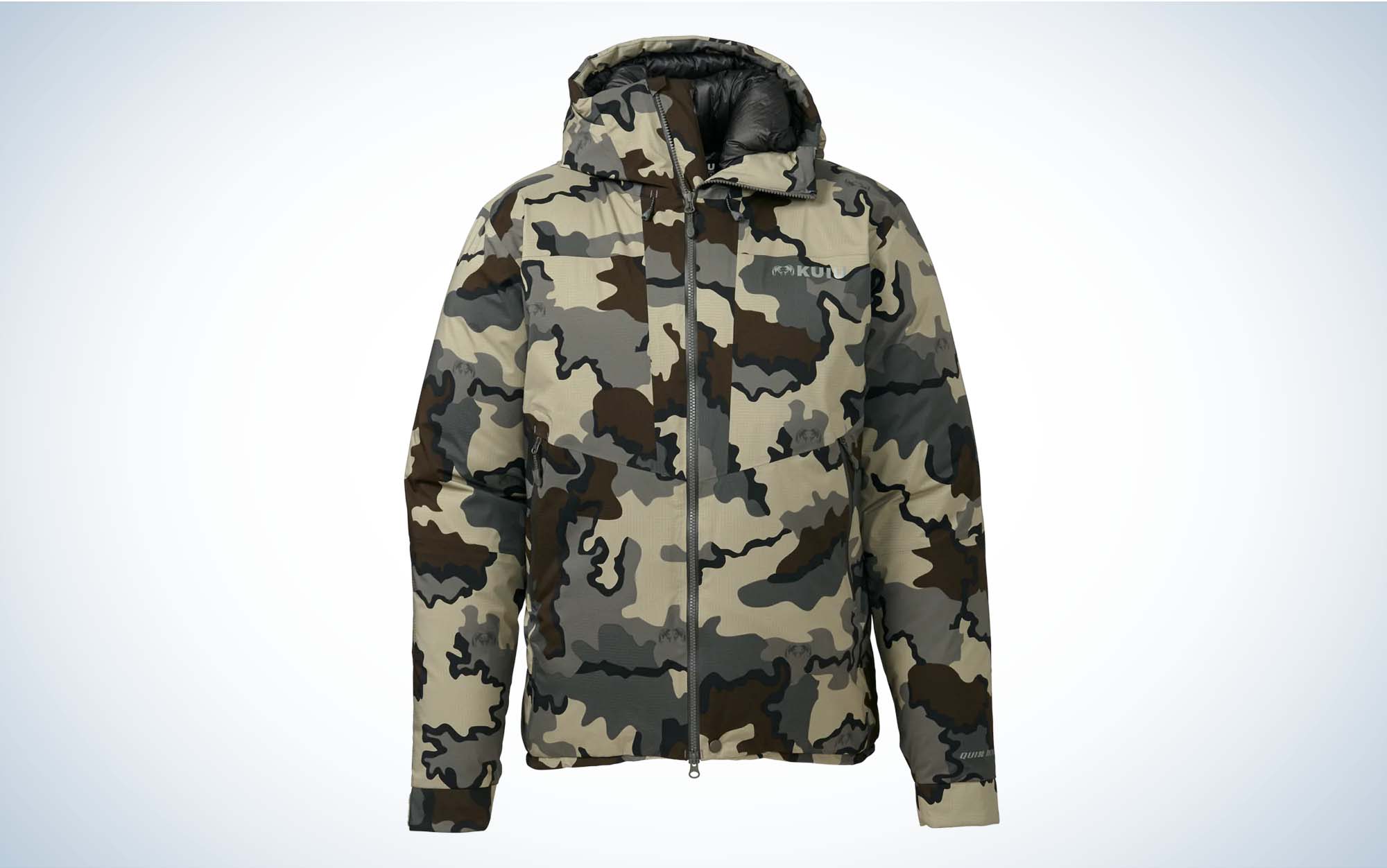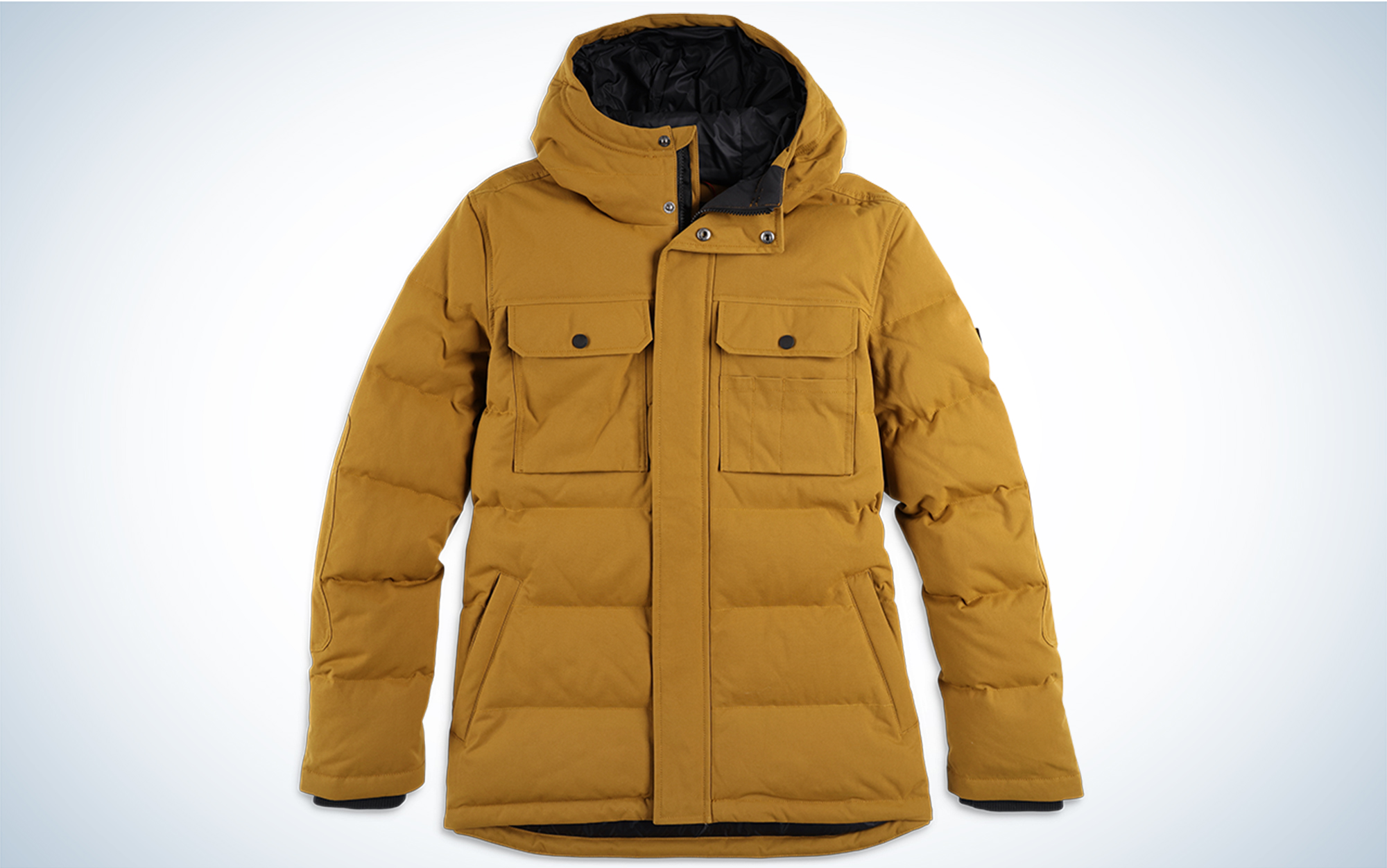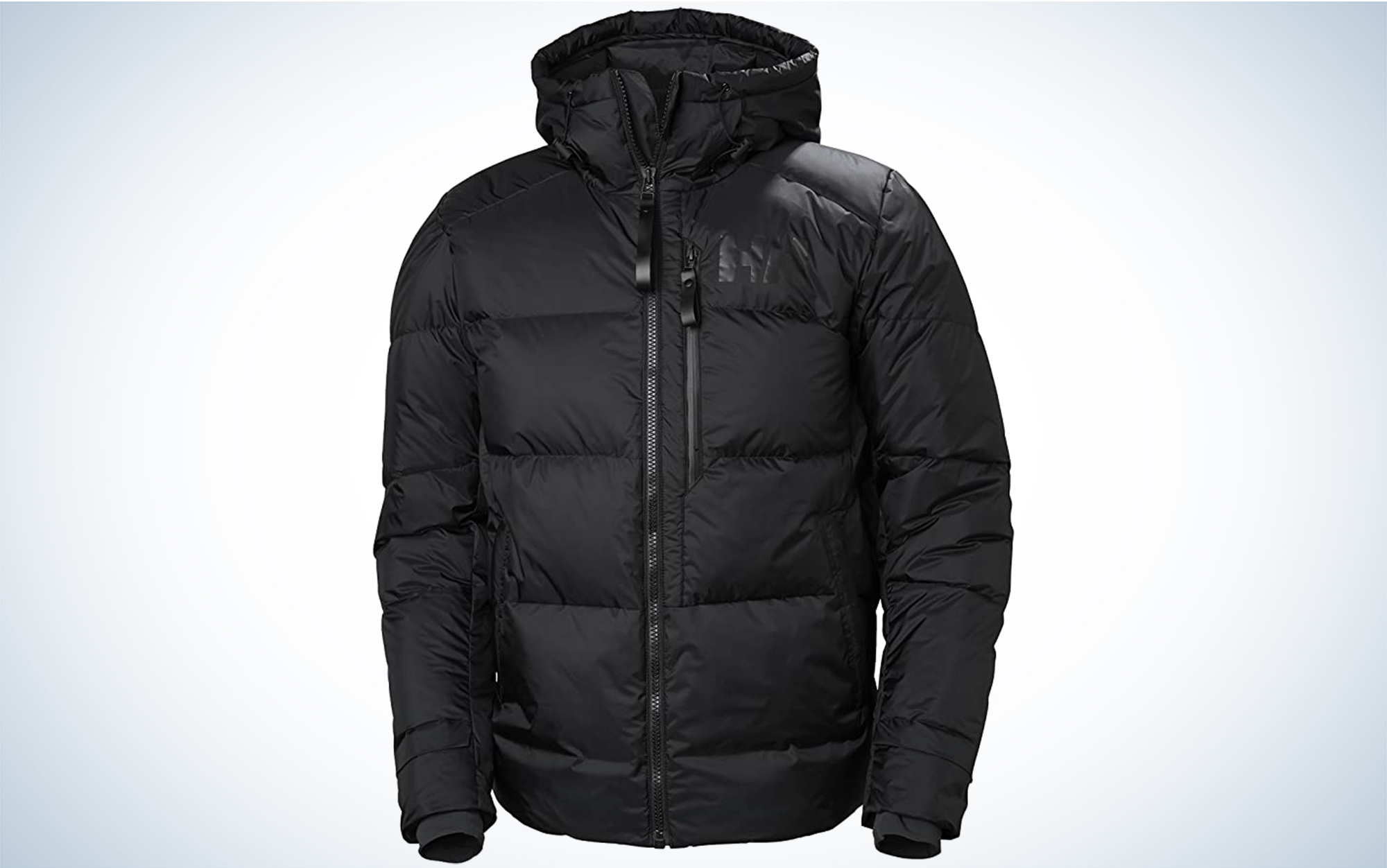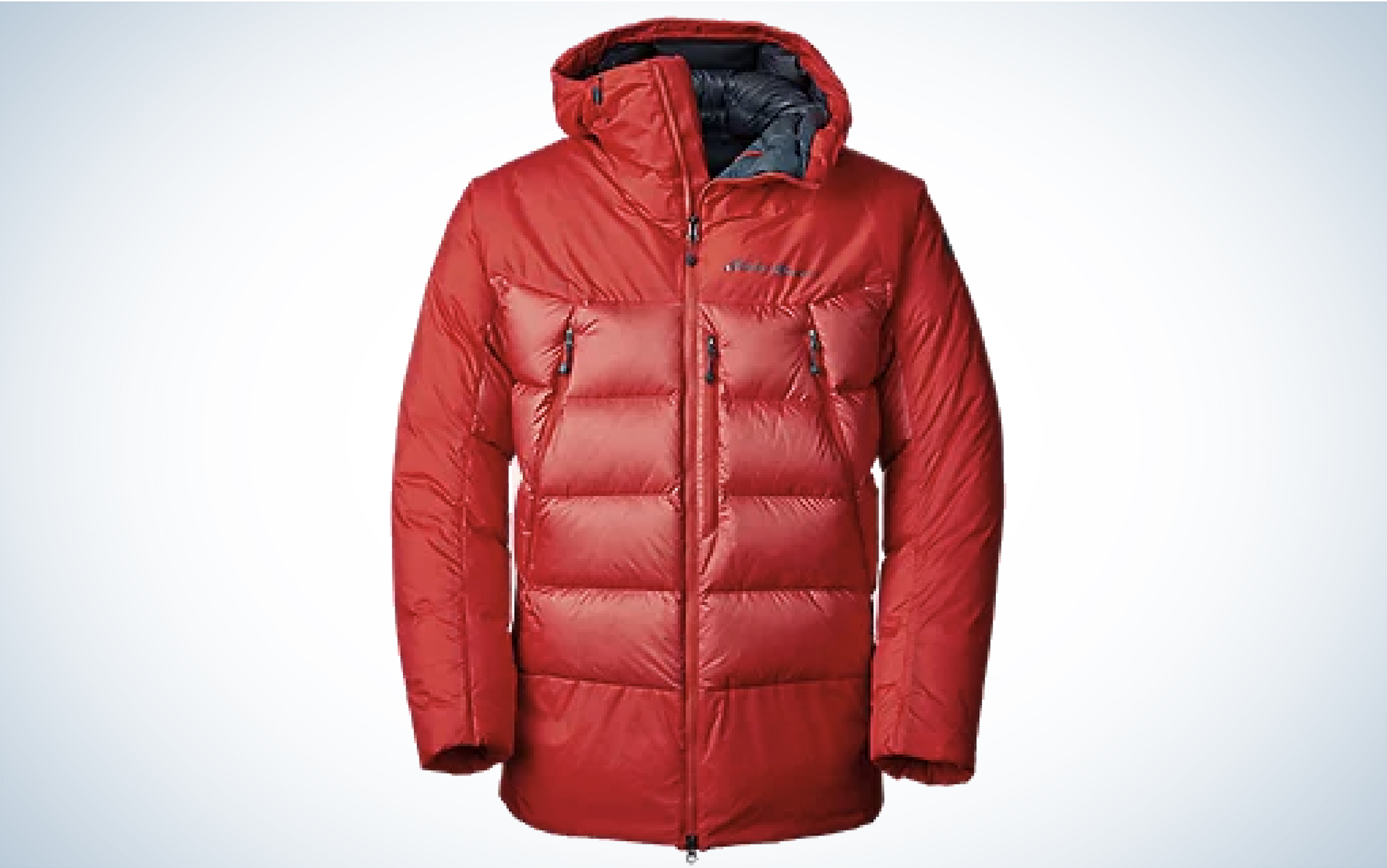We may earn revenue from the products available on this page and participate in affiliate programs. Learn More ›
I live in one of the coldest places on Earth: Alaska. Not many people have to wear a coat to go to the bathroom, but I do because I live in a dry cabin outside of Denali National Park, and trips to the outhouse during the heart of winter are brutal. I wear parkas from October through April. The worst weather I’ve experienced in my life was -52 degrees with winds that swept me off my feet while climbing Denali, the highest peak in North America.
Given the Alaska life, I knew I could easily vet out the best men’s parkas in the business. If you are exploring the great outdoors anytime and anywhere during the winter, you are going to want some kind of parka. Whether you are skiing, snowshoeing, snow machining, mountaineering, or hiking, the parka can keep you warm while on the move. Here are some of the best men’s parkas I’ve tested over the years.
How I Tested the Best Men’s Parkas
I researched and used my past experiences with parkas to find who makes the best and why. Then, I found a range of jackets from budget-friendly to high-quality performance options and compare the differences. For testing, I ventured out into the Alaska wilderness just outside my front door.
Best Men’s Parkas: Reviews & Recommendations
Key Features
- Unique baffle construction
- Stylish
- 800-fill down
- Packable
Pros
- Helmet-compatible hood
- Lightweight
- Environmentally friendly
Cons
- Expensive
- Can easily tear
- Zippers snag
The AlpLoft Down Parka’s baffles that hold in the 800-fill down are made of a single piece of material, which eliminates extra stitching and keeps the down lofted to reduce any potential cold spots. The innovation of seamless weaving also means fewer failure points, and even after months of use, everything is still in good shape.
It was easy to seal in the warmth on this parka. Within the helmet compatible hood, there is a high draft collar that wraps around your neck like a scarf, and the hood is easily cinchable with a single pull cord on the back of the hood. The two-way front zipper has a double draft collar behind the zipper that creates a windproof barrier. Our tester did note that at times the zipper would catch on material from this double collar.
There are six pockets total. The outer four are zippered and all have pull cords for easy function even with gloves on. They are also very deep to fit lots of gear. The two inner dump pockets are on the smaller side, but can fit bars and small electronics to keep them warm against your body.
For as warm, lofty, and heavy duty as this parka looks, it weighs only 24 ounces and packs into the included stuff sack down to the size of a football perfect for a stow and go jacket.
This men’s parka fits Patagoina’s ethical responsibility mold with its fair-trade construction. The nylon shell is recycled from leftover material—like that from weaving mills and post-consumer fishing nets—which reduces CO2 emissions compared with virgin nylon created from petroleum. Further, their water-repellent DWR coating does not use per- or polyfluorinated chemicals, and instead uses an environmentally safer alternative to achieve water repellency. Lastly, the down is certified responsible, and the jacket is made in a fair-trade factory in Vietnam.
Key Features
- 800-fill down
- 20-denier rip stop fabric
- Waterproof shell
- Under arm vents
Pros
- Extremely warm
- Feature-rich innovation
- Durable
- 12 storage pockets
Cons
- Expensive
- Not for everyday use
- Bulky
- Heavy at 3 pounds
With a name like Absolute Zero, it exudes extreme use. I can attest that this jacket can handle temps well below 0 degrees Fahrenheit. A staple piece of gear for many high-altitude climbers, I used a previous model of this jacket while exploring the Alaska Range and climbing Denali. Additionally, my wife and I used it while volunteering on the Iditarod in remote arctic checkpoints during subzero conditions. More specifically, the 800-fill down parka kept me warm in temps down to -40 degrees Fahrenheit with winds gusting to 50 mph.
If that is not enough, this updated jacket has some futuristic features. My favorite is the massive 17-inch underarm zips to dump heat, as this is something you don’t typically see in a parka. The huge 7.5-inch draft collar extends over your face and Velcros together. It even has the ability to stow away in a pocket when you just want to use the hood and not the collar. The ingenious craftsmanship continues with stretchy wrist cuffs that feature a 6.5-inch tight material that cinches tightly around your wrist with a watch window so you never have to pull up your cuff in freezing temps to check the time or distance on your GPS watch. The two-way front zipper works great with your climbing harness and has a draft collar underneath each side of the zipper.
This coat has a whopping 12 pockets both on the inside (four) and outside (eight). These include two huge zippered pockets on the chest, one on each sleeve, and four at your waist. All the pockets have large zipper pulls that can be opened with mittens and are roomy enough to store food, an avalanche transceiver, electronics, hand warmers, extra gloves, and more. The interior of the jacket has built in straps that look like suspenders allowing you to strap into your pants for extra support. Bonus: Each sleeve has a Velcro square for you to attach your nation’s or team’s flag.
It comes with a stuff sack, but the tradeoff is it only packs down to the size of a small sleeping bag. Another tradeoff is the price. Still, I cannot praise this jacket enough for battling the coldest temps and keeping me alive, which is worth every penny.
Key Features
- Waterproof
- Windproof
- 9 ounces of insulation
Pros
- Mesh pit zips
- Included stuff sack
- Comes in a camouflage pattern
Cons
A traditional down jacket is not what you want to be wearing on hunting trips. Not only does down lose its insulating capability when wet, but there’s bound to be bushwacking while searching for game and some jackets can get caught on branches and tear easily.
In this parka, the stretchy three-layer nylon exterior is more durable, and the proprietary 850-fill Quixdown down is treated with DWR, thus keeping moisture away, so you stay dry even when wet.
There are zero cold spots on this jacket. You can cinch it tighter in just about every part on the upper body—two different spots on the hood, both sides of the waist, a middle cinch about 9 inches around the torso accessed from each pocket, and both cuffs with Velcro. Cold cannot penetrate the two-way zipper thanks to the 2 inches of backing as well as a snap button on the bottom and a zipper pouch on top (one of my pet peeves is my zipper hitting me in the chin). The massive hood is packed with insulation and has a 4-inch draft collar.
You can never have enough pockets, especially on a hunt. This parka has two seam-sealed hand pockets where I stored my phone and GoPro, one zippered interior pocket on the chest where I kept my SPOT, and a huge open dump pocket where I stored my gloves and beanie when I heated up.
One standout feature that is a rare find in down jackets is the internal mesh underarm zips, which means a bit of breathability when sweating up a storm.
At 1 pound 12 ounces, this jacket isn’t the lightest, but it kept me dry and warm while exploring the windy, wet southern coast of Alaska, where the weather can turn on a dime. Bonus: I used this as extra insulation while camping, allowing me to carry a lighter sleeping bag.
Key Features
- Thick canvas shell
- 700+ fill down insulation
- Water-resistant
- Windproof
Pros
- Durable
- Affordable
- Extra insulation in shoulders
- Pockets galore
- Extra material on elbows
Cons
- Heavy at 2.7 pounds
- Does not pack down
- Strange cuffs
Our tester noted this jacket crosses the line between work, play, and everyday use. The calling card on the Del Campo parka is its 320-denier exterior shell made of burly nylon canvas, which is built to protect against any weather and be durable for years of rugged conditions. With a snap and two-way zipper closure accompanied by a storm flap, this double reinforced front truly keeps the wind and cold out. The cinch bottom cuff with extra canvas around the waist and a drawcord hood battens down the hatches even more. The wrist cuffs have a “gaiter” made of cotton meant to prevent any cold air seeping in, but our tester said they wet out in extreme precipitation and looked like an old school sweater cuff.
However, there are two deep, soft-lined hand pockets that zip up, two medium chest pockets with a one-snap closure, with one of the pockets having outside pencil pockets. Inside the jacket, you have one large mesh dump pocket with a snap closure that can fit hats and/or large gloves/mittens. There’s also a zippered interior chest pocket which can keep a phone warm, although our tester noted it’s a bit hard to find.
There are some downsides. The parka doesn’t feel like it has that much stretch and though the insulation is 700+ fill down, the downside is it’s not packable and heavy at 2.7 pounds.
Still, if you are looking for something to cross over from simple everyday use to backcountry travel and work in the field, this is one is the right pick and is built to last a lifetime. Plus, it’s a great price to boot.
Key Features
- Polyester synthetic fill
- Water repellent
- Windproof
- Breathable
Pros
- Huge front zipper pull
- Tail drop
- Pockets galore
Cons
- Front zipper pull can hit you in the face when fully zipped up
- “Helly Hansen” written in huge letters across the hood
- Small zipper pulls for the hand pockets
At $300, the Active Winter parka is cheaper than others out there, but I was pleasantly surprised at how well it held its warmth and how many features it still boasts.
I feel like the stay puff marshmallow man in this parka, as you can feel the compressed polyester throughout the jacket with each baffle bulging out. Yet, I appreciated the full-bodied insulation that kept me warm when temps dipped to the -20s.
I loved that the cinch around the cuffs retracts into the jacket, mimicking gaiters around your wrist. The hood is well insulated with easy-to-adjust drawstrings on either side. The back of the jacket has a drop-in tail, which helps keep the cold air from blowing in from underneath and provides a seat warmer when taking a break on snow.
The chest pocket is easy to access with a huge pull but was not as big as I wanted it to be as it could not fit my avalanche beacon. The interior pockets make up for this, as there is one large mesh and one large zipper pocket on either side. The two exterior hand pockets are average size. But do zip up. With gloves on, I give it a ding for the small zipper pulls—a bit cumbersome.
Pro Tip: I recommend upsizing this men’s parka. I am a medium and feel the large would have been a better fit, especially with additional clothing underneath.
Key Features
- Climbing harness capable
- 800-fill down combined with synthetic insulation
- Set back elastic cuffs
- Windproof
Pros
- Affordable
- Oversized
- Made with DWR materials
- Responsible, trackable down insulation
Cons
- Hand pockets are high up (not ideal when not wearing a harness)
This parka made the cut mainly because it’s made for mountaineering. The 2-way zipper and high hand pockets mean it fits perfectly with a climbing harness making for easy belaying and accessing your pockets without taking your harness off. Adjustability is nice, with one at the waist and two on the hood.
The insulation is a blend of 800-fill down and synthetic, so it not only kept me plenty warm while snowshoeing on the outskirts of Denali National Park, but I didn’t have to worry when it started to change to freezing rain. The warmth was sustained. The 30-denier ripstop nylon fabric kept all the down in with no problems even when bushwhacking through thickets of willows and alders.
The hood works perfectly with or without a helmet, and I especially love the elastic cuffs, which are set back in the sleeve and can fit under or over your glove.
Six pockets (four of them zippered) provide plenty of room to stash all types of gear, snacks, and your beacon. I used this jacket when temps dipped into the -30s, and with minimal layers underneath I was plenty warm.
Things to Consider When Buying a Men’s Parka
Comfort
First and foremost, comfort is key. Think of a parka as your favorite blanket wrapped around you, something you cherish and go back to constantly. Your men’s parka needs to fit you well and be able to move with you. It should be able to fit multiple layers underneath, so going one size larger may be a better choice. If you are trying on parkas in a store, walk around, bend over, sit, and move around in them to make sure they feel like an extension of your body and aren’t cumbersome. An adjustable hood is a must for a reliable parka. I like hoods that adjust on the back of the hood as well as on either side of your neck. A bigger hood is a plus for when you are wearing a climbing helmet.
Durability
Most likely, you are going to own this coat for a very long time, and you want it to last a lifetime. Make sure the outer shell is made with a heavier fabric that won’t rip as easily as your puffy jacket. Constantly check and inspect your parka for any rips, tears, and pulls, and fix them before they get worse.
Warmth
This is an obvious one. If you are researching men’s parkas, you must be going to or living in a cold place. Ask this question: Would you rather be too warm or too cold? I would choose too warm, so pick out a parka you think would match or exceed the weather conditions you are venturing into. Also look for parkas that state they have DWR coating or some type of waterproof quality to them if you think you will be getting wet. It is best to have a windproof parka.
The cuffs on your sleeves are important, too. Make sure they are adjustable or have some type of cinch to them. This keeps the cold and snow out. It also allows you to secure them over your glove. Also having a cinch around the hem of your waist helps keep your parka down when you lift up your arms and keeps the cold air and snow out.
Convenience
Beefy zippers with long pulls is a must. Most of the time, you are trying to unzip with heavy gloves on. Having a two-way zipper helps when you need the dump some heat or when wearing a climbing harness. Most of the time, you store your parka in your pack when not using it. Down packs smaller than synthetic materials. If the parka comes with a stuff sack, that is great. If not, consider getting one.
Pockets help keep your gear organized when not stored in your pack. It is better to be able to reach into one of your pockets than stop and take off your pack. Make sure you have at least a few pockets that can zip up and some interior pockets that are big enough to hold food and maybe a water bottle to prevent it from freezing. I like pockets that can hold my avalanche receiver, phone, camera, GoPro, snacks, SPOT, sun lotion, chapstick, and knife.
Synthetic vs. Down
This is a personal preference, and they both have different benefits.
Down
- Pros: It is typically warmer than synthetic. It is very compressible, durable, and can last a long time with proper care.
- Cons: Loses its insulation when it gets wet and takes a long time to dry out. Cleaning a down parka requires special care. Down is also more expensive than synthetic.
Synthetic
- Pros: It is water-resistant, even when wet and less expensive than down.
- Cons: Synthetic is also heavier and bulkier than down and provides less warmth. After a time, it loses its full insulation ability when constantly being stuffed.
Newer to the market is Hydrophobic Down, which is down material that has been coated with a chemical to make it absorb less water and dry faster.
Why Trust Outdoor Life?
Since 1898, OL has been a leading authority in testing and reviewing hunting gear, fishing tackle, guns and shooting equipment, and much more. We have more than a century-long history of evaluating products, and we’re now bringing that expertise to online reviews. Our editors are experienced outdoorsmen and women, and most importantly, we’re trained journalists. We prioritize field testing and objective data when reviewing products. We conduct interviews with gear manufacturers and engineers as well as outdoor experts so that our readers have an understanding of how and why a product works—or doesn’t.
Advertising does not influence our gear reviews and it never will. While we always focus our coverage on standout products—because we want our readers to be aware of the latest and greatest gear—we also cover the flaws and quirks of any given product.
Final Thoughts
Before investing in my first men’s parka, I did a ton of research. I looked at magazines and online for quality reviews that would lead me in the right direction. I also talked to like-minded people who have been doing the same activity that I wanted the parka for. Then, I gathered real feedback and then went to my local store to try on several options. I even rented a heavy parka for a Mount Rainier climb. I’d recommend you do the same prior to any substantial gear investment, like the best men’s parka.

